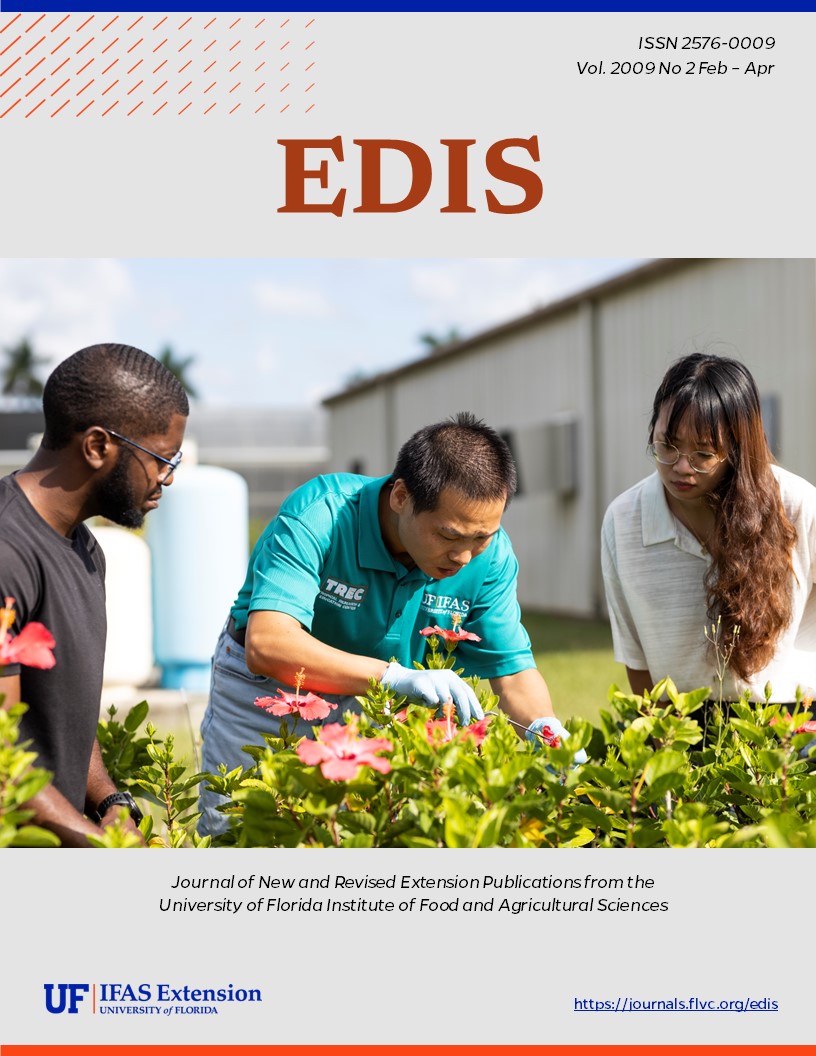Abstract
EENY-422, a 4-page illustrated fact sheet by Kevyn J. Juneau and Phillip E. Kaufman, is part of the Featured Creatures collection. It describes the smallest of the five sucking lice that feed on cattle, its distribution, description, biology, hosts, economic importance and management. Includes selected references. Published by the UF Department of Entomology and Nematology, February 2009.
References
Allen NN, Dicke RJ. 1952. Cattle lice control by clipping. Journal of Economic Entomology 45: 970-973. https://doi.org/10.1093/jee/45.6.970
Cleale RM, Lloyd JE, Smith LL, Grubbs MA, Grubbs ST, Kumar R, Amodie DM. 2004 Persistent activity of moxidectin long-acting injectable formulations against natural and experimentally enhanced populations of lice infesting cattle. Veterinary Parasitology 120: 215-227. https://doi.org/10.1016/j.vetpar.2004.01.004
Durden LA, Musser GG. 1994. The sucking lice (Insecta: Anoplura) of the world: A taxonomic checklist with records of mammalian hosts and geographical distributions. Bulletin of the American Museum of Natural History No. 218, 90 p.
Ignoffo C. 1959. Key and notes to the Anoplura of Minnesota. American Midland Naturalist. 61: 470-479. https://doi.org/10.2307/2422514
Grubbs MA, Lloyd JE, Kumar R. 2007. Life cycle details of Solenopotes capillatus (Anoplura: Linognathidae). Journal of Economic Entomology 100: 619-621. https://doi.org/10.1093/jee/100.2.619
Holdsworth PA, Vercruysse J, Rehbein S. Peter RJ, Letonja T, Green P. 2006. World Association for the Advancement of Veterinary Parasitology (W.A.A.V.P.) guidelines for evaluating the efficacy of ectoparasiticides against biting lice, sucking lice and sheep keds on ruminants. Veterinary Parasitology 136: 45-54. https://doi.org/10.1016/j.vetpar.2005.11.008
Kaufman PE, Koehler PG, Butler JF. (2007). External parasites on beef cattle. EDIS. http://edis.ifas.ufl.edu/pdffiles/IG/IG13000.pdf (14 November 2007).
Kaufman PE, Rutz DA, Doscher ME, Albright R. 2001. Efficacy of chlorfenapyr (AC 303630) experimental pour-on and CyLence® formulations against naturally acquired louse infestations on cattle in New York. Veterinary Parasitology 97: 123-129. https://doi.org/10.1016/S0304-4017(00)00439-8
Matthysse JG. 1946. Cattle lice: Their biology and control. Cornell University Agricultural Experiment Station Bulletin No. 832, 67 p.
Nafstad O, Gr¯nst¯l H. 2001. Eradication of lice in cattle. Acta Veterinaria Scandinavica 42: 81-89. https://doi.org/10.1186/1751-0147-42-81
Price MA, Graham OH. 1997. Chewing and sucking lice as parasites of mammals and birds. U.S. Department of Agriculture Technical Service Bulletin No. 1849, 309 p.
Skogerboe TL, Smith LL, Karle VK, Derozier CL. 2000. The persistent efficacy of doramectin pour-on against biting and sucking louse infestations of cattle. Veterinary Parasitology 87: 183-192. https://doi.org/10.1016/S0304-4017(99)00186-7
Townsend L. (October 2000) Lice on beef and dairy cattle. University of Kentucky Cooperative Extension Service. http://www.ca.uky.edu/entomology/entfacts/entfactpdf/ef512.pdf (14 November 2007).
Watson DW, Lloyd JE, Kumar R. 1997. Density and distribution of cattle lice (Phthiraptera: Haematopinidae, Linognathidae, Trichodectidae) on six steers. Veterinary Parasitology 69: 283-296. https://doi.org/10.1016/S0304-4017(96)01122-3
White WH, Hutchens DE, Jones C, Larry D, Firkins LD, Paul AJ, Smith LL, Snyder DE. 2007. Therapeutic and persistent efficacy of spinosad applied as a pour-on or a topical spray against natural infestations of chewing and sucking lice on cattle. Veterinary Parasitology 143: 329-336. https://doi.org/10.1016/j.vetpar.2006.08.037
Yeruham I, Rosen S, Hadani A. Braverman Y. 1999. Arthropod parasites of nubian ibexes (Capra ibex nubiana) and gazelles (Gazella gazella) in Israel. Veterinary Parasitology 83: 167-173. https://doi.org/10.1016/S0304-4017(99)00073-4

